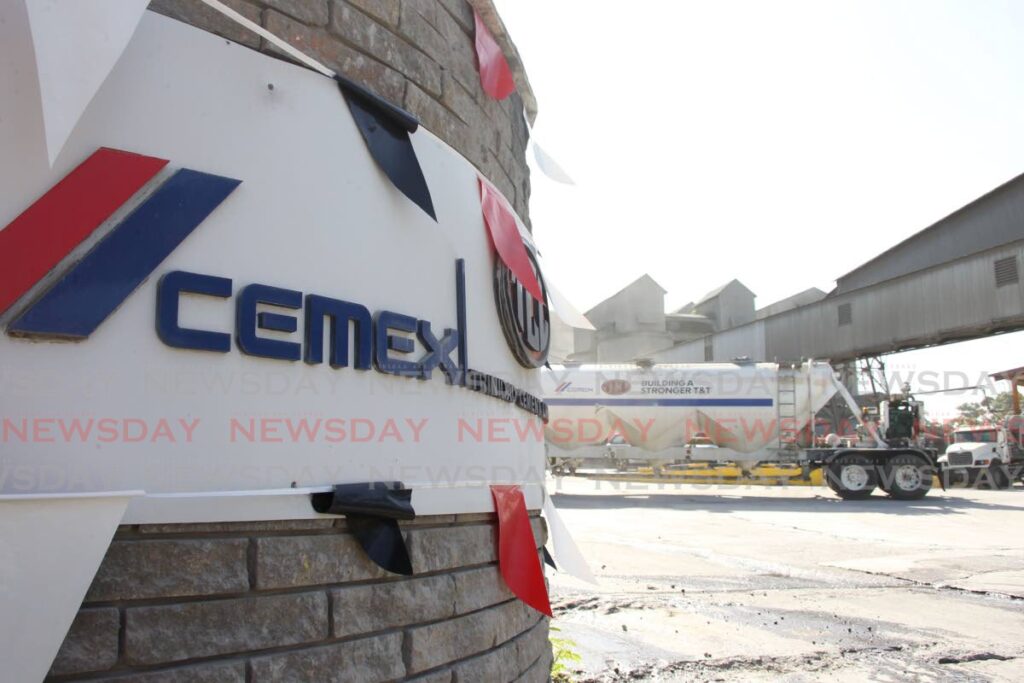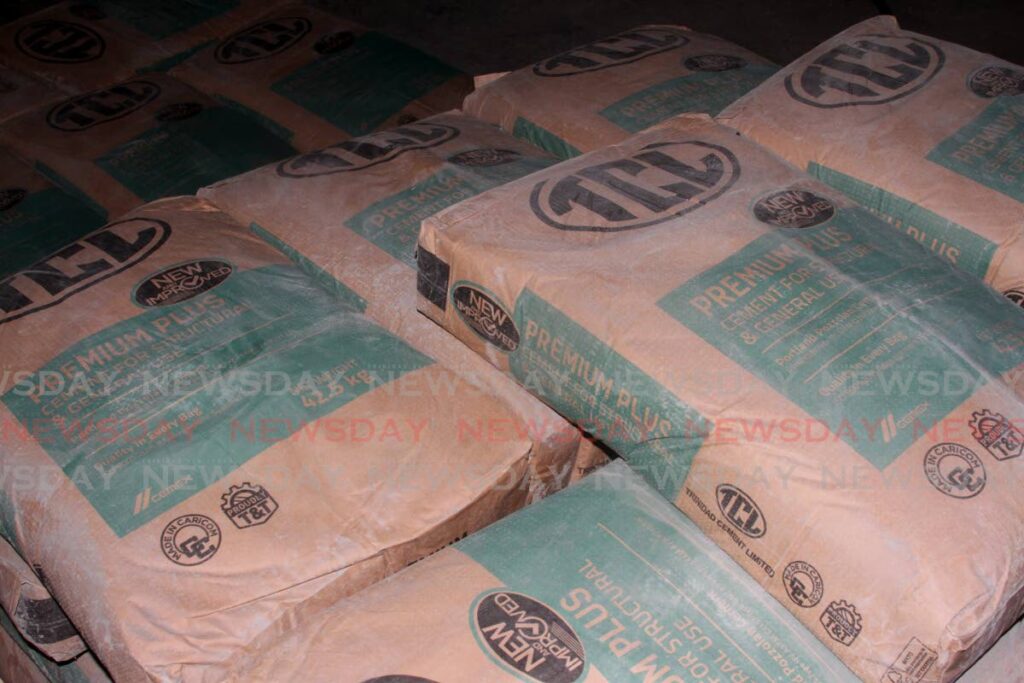TCL to raise cement prices again by March 20

Trinidad Cement Ltd (TCL), the country's sole cement supplier, is set to raise prices yet again by March 20.
TCL officials confirmed on Wednesday that the ex-factory prices will increase by five per cent for ECO cement and eight per cent for premium plus. This amounts to respective increases per 42.5kg bag of $2.08 to $43.65, and $3.54 to $47.83, before VAT.
Newsday was told that the announcement of the impending price increases was made to stakeholders in the construction industry last week.
“Cement prices are in fact set to be marginally adjusted, taking into consideration some of the rising cost factors with which TCL is faced,” said the company in response to questions from Newsday.
In December 2021, TCL raised the price of a 42.5kg bag of ECO cement by eight per cent to $43.71 VAT-inclusive, and by 15 per cent to $46.56 VAT-inclusive for premium of the same weight. At that time, the prices before VAT were $38.85 and $41.39 respectively. However, the new proposed price list showed before-tax prices of $41.57 and $44.29 respectively, suggesting there was an another adjustment since 2021.
Owned by Mexican cement giant, Cemex, TCL told Newsday that cement is locally produced and had not been affected by the same price volatility as lumber and steel throughout the covid19 pandemic.
“However, the cost of local inputs which represents 75 per cent of TCL’s total expenses continues to rise, along with key items such as refractory bricks and electronic parts for which in some cases, the prices have been doubled because of the energy crisis in Europe, triggered by the Russia/Ukraine war,” TCL said.
Checks at hardwares revealed that the average retail price for a bag of premium cement was $54. TCL noted its cement prices, despite the increases, are considerably lower than its prices seven years ago.
Contractors Association president Glenn Mahabirsingh on Wednesday said this would be the third price increase for TCL cement in 16 months. He said in August 2022, prices went up by seven per cent.

“What the construction industry has experienced is that over the last 16 months we have experienced an overall increase in cement of 27 per cent,” he said. “We have seen increases every six to seven months. This makes it very difficult for estimating and cost planning.”
He explained that cement is one of the main inputs in constructing homes – from the manufacturing of blocks to precast concrete units to installation of blocks and finishing the block work with rendering and plastering.
“After aggregate, cement is the second most important building material in the industry. So cement is very critical for any construction. It could be an individual doing home improvement or doing a mega project.”
He said a basic 600 sq ft two-bedroom home would cost about $360,000 to construct. Cement in its various forms could take up the cost of most small to medium-sized projects by three to five per cent. On average, a person building a basic home would need an estimated 180 to 200 bags of cement for the foundation, blocks and rendering and plastering.
While Mahabirsingh noted that the cost of other construction materials such as lumber, rebar and nails has decreased, owing mostly to a reduction in freight costs, he was not confident that it would offset the cement price increases.
At the height of the covid19 pandemic, the cost of a tonne of steel was an estimated $12,000. It is now down to $8,500, he said. On this point, TCL said steel and lumber are mainly imported goods and have been fully impacted by the volatility in freight prices.
“Since 2019 and up until recently, these materials have increased in price by over 100 per cent and therefore, even though there has been a current reduction in freight, the significant net price increase over the last three years acts as a reasonable buffer for local importers – allowing some degree of flexibility in their current pricing strategy,” TCL said.
Mahabirsingh said most of TT’s steel is imported from Turkey where they were deadly earthquakes in February, and as its own demand for construction materials may increase impacting supply, which is likely see prices rise again.
Minister of Trade and Industry Paula Gopee-Scoon when contacted on Wednesday said Government has noted TCL price increases.
“The Government is of the firm view that the availability of affordable cement forms a critical linkage between the manufacturing and construction sectors and therefore is vital for the country’s sustainable development as well as the welfare of consumers,” Gopee-Scoon said.
“As a consequence, the Government has expressed its strong concern to the local manufacturer on the impact of price increases on the public.”
Gopee-Scoon assured that Government will continue monitoring conditions in the domestic market and may make further policy adjustments as required to ensure affordable cement for consumers.
While he did not use the word “monopoly,” Mahabirsingh said there is a dire need for competition in the cement industry.
“Really what the industry needs is different choices,” he said. “Just like any other construction product – you name it, paint, building materials, blocks, aggregate – you have different choices and different people entering the market and competing.”
He said with different choices there will be competitive prices, which would be to the benefit of the customer.
TCL’s last competitor, Rock Hard Cement – a Barbados-based cement importer which got its supplies from Turkey – pulled its operations from TT in 2021 amid complaints of heavy tariffs and customs duties.
The company blamed its closure on the “continuous challenges from Government to its ability to do business in TT.
In November 2021, Government revised the quota and import licensing regime for 2022, raising the quota ceiling for cement allowed for importation by 50 per cent, from 75,000 tonnes in 2021 to 150,000 tonnes in 2022.
Government also convinced Caricom at a special meeting of the Council for Trade and Economic Development (COTED) to suspend the CET and increase the rate of duty to 20 per cent on “other hydraulic cements” for a year starting January 1, 2022.
The rate of duty on other hydraulic cements was in effect reduced from 50 per cent to 20 per cent.
But the adjustments would have still had a deleterious effect on Rock Hard’s ability to do business and remain viable in TT, it told the Caribbean Court of Justice (CCJ) in an application to have the tariffs reversed.
It said the COTED decision was “flawed” and threatened trade expansion with other countries.
It also contended that COTED wrongly allowed TT to impose a tariff much higher than the World Trade Organisation’s bound rate of five per cent. Rock Hard lost its application to the CCJ in March 2022.
TCL said a CET that is too low would reduce the ability of local producers to compete against non-Caricom manufacturers with more favourable cost conditions. It said any decision against maintaining a proper CET aligned with current conditions in the market could have an irreversible effect on local manufacturers' ability to sustain their business.
“One of the issues with cement production in Caricom is that the external competition has been unfair,” TCL said. “Whenever, there is unfair competition and price distortions by third suppliers, such as with the cement imported from Turkey, the CET plays a second important role – that of protecting the regional and domestic cement producers from being destroyed by cement imported, which benefit from unfair conditions.”


Comments
"TCL to raise cement prices again by March 20"